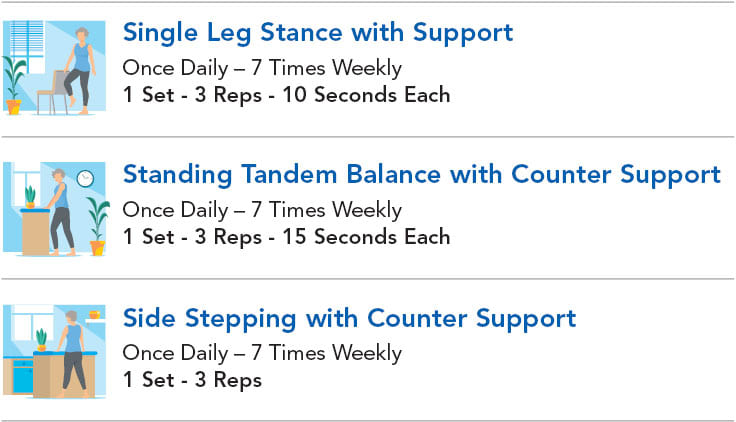More Topics
◀ Home
How to stay healthy as you age
The Centers for Disease Control and Prevention (CDC) defines aging in place as “the ability to live in one’s own home and community safely, independently and comfortably, regardless of age, income or ability level.” To age in place gracefully, start thinking about what help you may need in the future. You may not need this help right now, but planning ahead can ensure you or your family keep living your fullest life.
 Get preventive care
Get preventive care
Visiting your doctor every year for an annual wellness visit can help you stay on top of your health. Getting preventive care, such as flu or covid vaccines and cancer screenings, can also help you stay healthy by preventing illness or catching issues early.
Keep your doctor updated by listing any long-term health challenges or changes to your health that you or your family members might have. You should feel confident asking your doctor to explain any recent lab work or tests you’ve had. If you have more than one provider, they should talk to each other to coordinate your care.
Avoid fall risks
According to the Office of Disease Prevention and Promotion, more than one in four older adults fall each year. Learning how to lower your risk of falling can help you avoid broken bones and other problems. Broken bones can cause pain and disability, making it harder to do everyday activities, like cooking or taking a shower, without help.
Here are some things you can do to help prevent falls:
- Talk with your doctor about falls and how to prevent them
- Review your medicines with your doctor or pharmacist, as some medicines can make you dizzy or sleepy and cause you to fall
- Get your vision checked by an eye doctor every year and be sure to update your glasses or contact lenses when your vision changes
- Make your home safer by adding grab bars in the bathroom and shower, removing loose rugs or cords from the floor, and making sure you have good lighting
Improve balance and strength
As your ability to balance becomes more difficult, you increase the chances of getting injured from a fall. You may not realize that over time, standing on one foot for 10 seconds or longer can get harder. This slowdown in your balance can begin as early as age 50.
As your ability to balance becomes more difficult, you increase the chances of getting injured from a fall.
Try these simple balance exercises from Blue Cross of Idaho physical therapists. Just a few minutes a day, every day of the week, can help improve your steadiness.

Stay active
The National Institute on Aging says that people who exercise regularly live longer, healthier lives. A study of adults age 40 and older found that taking 8,000 steps or more per day, compared to only taking 4,000 steps, was associated with a 51% lower risk of death from all causes.
Here are a few ways you can be more active and increase your step count:
- Gardening
- Walking the dog
- Taking a few 10-minute walk breaks throughout the day
- Taking the stairs instead of the elevator
Get quality sleep
Getting good-quality sleep is an important part of your overall health, as it can affect your memory and mood. In a study of adults older than 65, researchers found that those who did not get enough sleep had a harder time concentrating than those who got good-quality sleep. Another study found that those in their 50s and 60s who got six hours of sleep or less a night were at a higher risk of developing dementia later in life.
Keep medical contact information handy
Create a large-type printed list of family and healthcare provider phone numbers and list your medications. This can help if you become disoriented or if a caregiver or friend needs to help you in an emergency.
Build your social group
Don’t isolate yourself, especially in winter. Take advantage of activities in your community, like the library or recreational and senior centers. Many community activities are free of charge or have discounts for seniors.
Prepare now for a healthy life later
Talk to your doctor about how health issues might affect your activities at home as you age. Preparing today for a healthier tomorrow can help you stay in your own home for longer.
Written by: Blue Cross of Idaho
Posted: December 7, 2022
Updated: September 8, 2025
